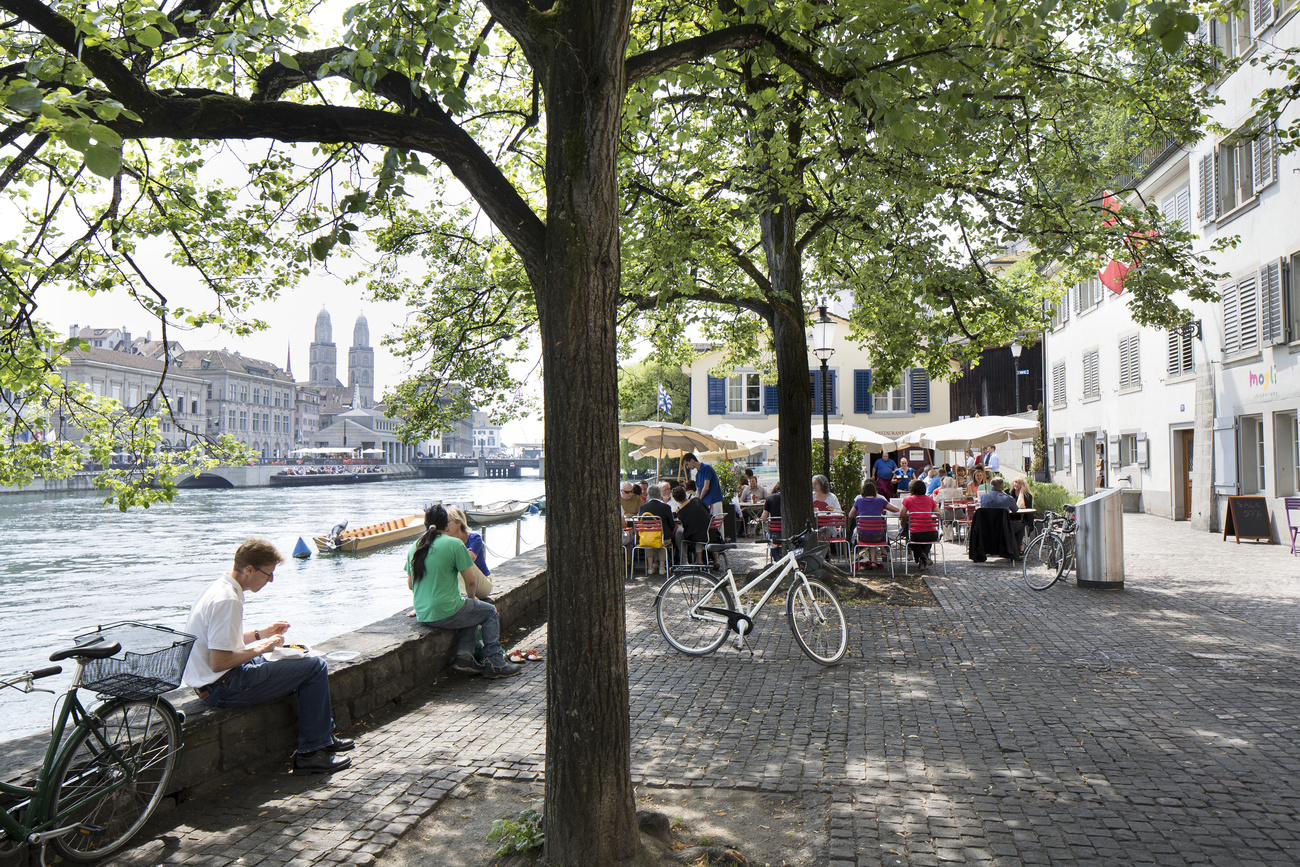Life in a nice, clean Swiss tax haven

Record low tax rates, political stability and high living standards have made Zug, one of Switzerland’s smallest cantons, a hard-to- beat place to live and work.
Visitors driving along idyllic Lake Zug, past farms and meadows, may be slightly bewildered by a sign at the entrance of the canton’s capital. It welcomes you in Arabic to the town Zug, “with its inhabitants from 128 nations.”
This number is not only remarkable when considering there are 193 United Nations member states, but also because just over 114,000 people live in an area of about 239 square kilometres. About a quarter of the canton’s population are non-Swiss, and 88 per cent of these come from Europe, mainly Germany. According to the Federal Health Office, 92 per cent of the people living in Zug consider themselves happy.
“The standard of living in Zug is second to none,” David Court, the Canadian manager of the popular Mr. Pickwick Pub near to the main train station, told swissinfo.ch. “The town really has built itself over the past years into a place offering everything one could ask for. I will probably retire here.”
Court said he had watched the town grow at an incredible pace over the past 15 years. From 3,900 companies offering 35,000 employments in 1975, Zug is today home to more than 10,000 work places with over 83,000 jobs, according to the Office for Economic Promotion. Roughly 45 per cent of these employers have less than two full-time employees. Even more significant is the number of registered corporations – which may include pure letterbox companies – which amounted to about 30,000 at the end of 2010, according to the registry of commerce.
Appealing tax rates
International companies such as German electronics powerhouse Siemens, American biotech pioneer Amgen or commodities giant Glencore have headquarters in Zug, many within walking distance of each other. One in 16 new companies founded in Switzerland is registered in Zug and the main reason for the canton’s appeal is its tax rate, which is about half of the Swiss average.
The tax levy on corporate profit is 15 per cent for ordinary and 8.8 per cent for privileged companies, according to a KPMG survey last year. But almost all of the tax revenue goes to the federal government, since the cantonal and communal rate in Zug is close to 0 per cent.
Privileged are holding companies, investment vehicles or management firms, which have no active or only secondary business in the canton. These rates compare with 21 per cent in Switzerland overall, roughly 30 per cent in Britain, Germany, Italy and France, and about 40 per cent in the United States and Japan.
Not only corporate tax-payers benefit from lower rates. Individual taxes are about 23 per cent in Zug, compared with more than 40 per cent in France, Germany and Italy and about 50 per cent in Britain, Austria or the Netherlands. Such levels not only attract wealthy foreigners, but also Swiss citizens like Novartis Chairman Daniel Vasella who lives in Risch on the shores of Lake Zug.
“Looking at the tax rates, it will be very hard to ever move away,” one resident told swissinfo.ch.
Like many German natives A.C. moved to Zug in search of a job. She works as an operation and patient manager at a hospital in Lucerne, while her husband works locally as a global purchasing manager.
“You really have everything: a good salary, short commutes, good education and great leisure facilities,” A.C. said.
From poor to rich
According to a Credit Suisse survey, which takes into account taxes, education, manpower and transportation, Zug was the top location in Switzerland in 2011. Historically, this has not always been the case.
In the 19th century, when Zug consisted almost exclusively of agricultural land, it was one of the poorest regions in Switzerland. In the 1960s, the canton had the highest per capita debt in the country, with an average income well below the national average. It was thanks to the initiative of entrepreneurs that the canton started to thrive.
In 1834 Wolfgang Henggeler built the first factory in the canton, a cotton mill in Unteraegeri, and American George Ham Page in 1866 started a small condensed milk factory in Cham, the first in Europe. Around the same time, Zug was connected to the Swiss railway network, allowing the canton to flourish.
Commodities trader Philipp Brothers located to Zug in 1956, ten years after the adoption of a new tax law. Favourable tax laws and its proximity to Zurich’s airport turned Zug into a financial and trading centre in the second half of last century.
Today, Zug and is the richest canton in Switzerland with an unemployment rate of 1.9 per cent and a gross domestic product, which BAK Basel Economics estimated at about SFr117,000 ($121,000) per head at the end of 2010.
Located 30 minutes from business centre Zurich and tourist magnet Lucerne, the canton has been stable economically, financially, politically and socially for many years. Inhabitants in Zug are less than 40-years-old on average and more than ten per cent have a university degree, a Swiss record, according to the Federal Statistics Office.
“Zug is beautiful and safer than anywhere,” Natalie Steyger, a housewife whose husband works at an international sports apparel maker, told swissinfo.ch. “After living in Cape Town and Sydney, it is a dream come true for us to live in such a peaceful place close to lakes and mountains with great outdoor sports like skiing.”
Foreigners are offered a range of support and assistance: in addition to an “expat guide” handed out by the economics ministry, there are four international schools and several international clubs catering to non-German speakers.
Skyrocketing property prices
According to Court, some Zug resident criticise the place as too slow, clean and nice. And one thing everybody moans about is the high cost of living. Property prices have skyrocketed in recent years: a six-room villa on the shores of Lake Aegeri could sell for up to SFr5 million, according to real-estate portal Homegate.
“Prices for apartments are extortionate,” said Petra Fetting, a Swiss citizen who has been living in the region for ten years. “Many Swiss cannot afford Zug’s prices and are driven out to the surrounding cities and cantons.”
Foreigners (individuals and companies) wishing to buy Swiss property must first obtain a permit from the canton where they wish to purchase. The number of such permits is strictly limited.
EU/Efta citizens and C-permit holders living in Switzerland are not considered “persons abroad” in this context.
Property bought for the purpose of creating a permanent business operation is exempt, unless the business trades, leases or rents that property out.
Foreigners buying property to use as a home must use it as their main residence.
Restrictions on foreigners buying Swiss property were put in place in 1961 aimed at preventing overseas investors from distorting the domestic housing market.
The regulations were enshrined in law in 1983 and modified later. A government proposal to abolish the rules was rejected by parliament in 2008.
There are two types of corporations at the forefront of business activity in Switzerland:
the “Aktiengesellschaft (AG)” and the “Gesellschaft mit beschränkter Haftung (GmbH)”.
These two kinds of legal entities offer the following advantages:
• Liability and risk limited to capital
• Simplified transferability of participation rights/shares
• Regulated representation rights
• Comparable with foreign legal entities such as the German GmbH, the US “Joint Stock
Company”, the English “Limited Liability Company” and the French “Société Anonyme”.
Besides forming an “AG” or a “GmbH”, it is also possible to have a branch of a foreign corporation inscribed in the Commercial Register, or to set up a private company which is not a legal entity in its own right.
Sole proprietorship is established by a private individual commencing a commercial activity. No minimum capital is required. The name of the firm consists of at least the owner’s surname.
(source: Canton Zug)

In compliance with the JTI standards
More: SWI swissinfo.ch certified by the Journalism Trust Initiative











You can find an overview of ongoing debates with our journalists here . Please join us!
If you want to start a conversation about a topic raised in this article or want to report factual errors, email us at english@swissinfo.ch.